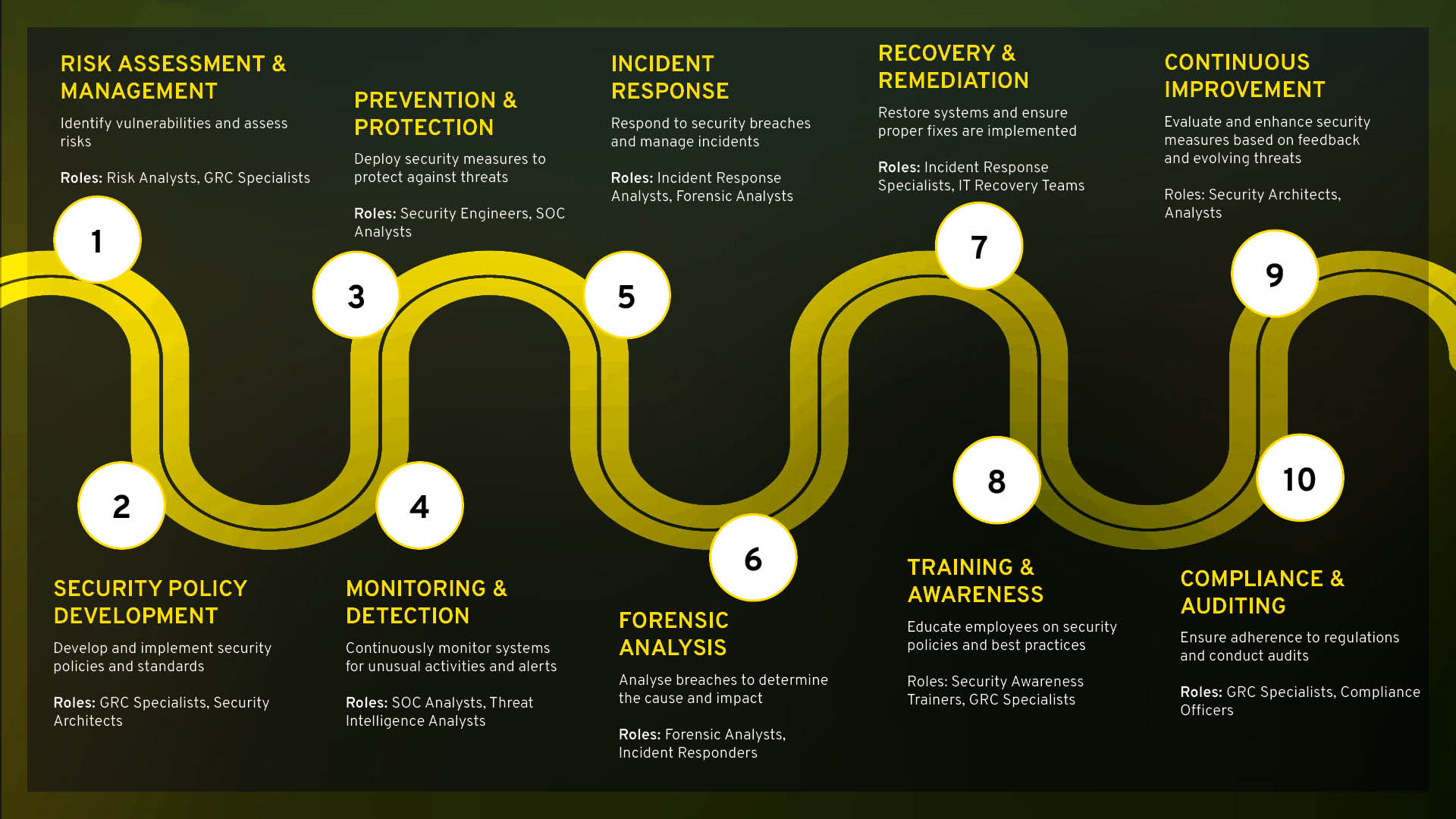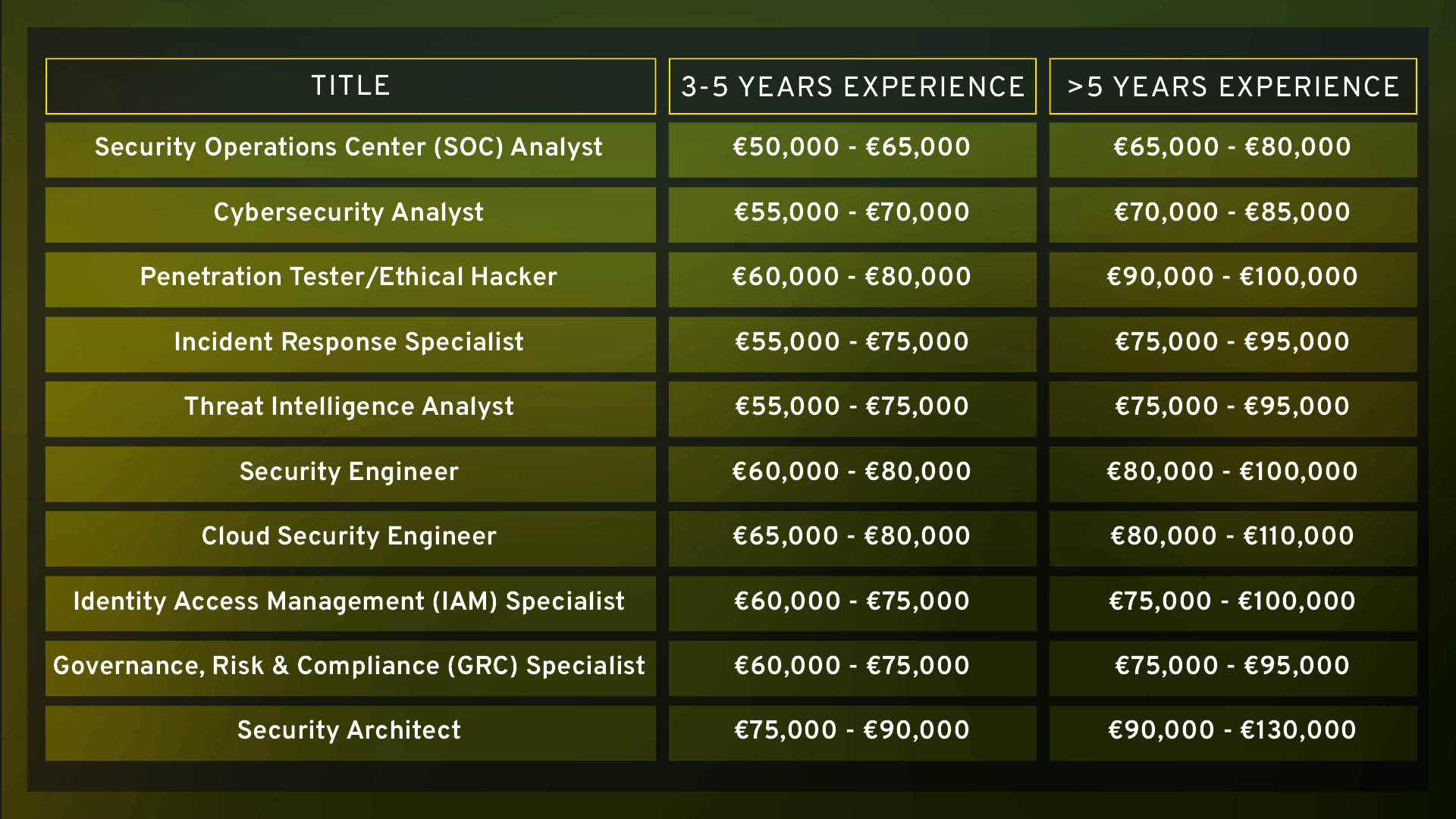The cybersecurity talent market is under intense pressure, with the demand for skilled professionals far exceeding supply. As cyberattacks become more plentiful and more sophisticated, the need for experts who can defend against threats has never been more critical.
Businesses today depend on cybersecurity specialists to protect their infrastructure and data, making these roles essential to operations. With remote work and cloud technologies, the urgency for top-tier talent continues to rise.
Through our direct work with cybersecurity professionals, here’s what we’ve noticed:
#1 Cybersecurity Lifecycle Continuum of Activity
In cybersecurity, roles often follow a continuum of activities aligned with the overall security lifecycle. Understanding this continuum of activity is key, as it shows the complexity of the field and highlights the importance of context when it comes to evaluating roles and responsibilities.
While some roles encompass all of these activities, not every role is directly involved in each step. Here’s a structured view of this continuum, along with relevant roles:

#2 Base Salary
Several key variables influence the salary ranges for cybersecurity roles in Ireland. Here are some important factors to consider:
- Certifications: Industry-recognised certifications such as CISSP, CISM, CEH, can significantly impact salaries, with advanced credentials leading to higher pay.
- Size of the Organisation: Large multinational companies tend to offer higher salaries compared to SMEs due to the complexity of their cybersecurity needs.
- Supply & Demand: Due to the ongoing talent shortage in cybersecurity, in-demand roles like Cloud Security Engineers and Security Architects often command significantly higher salaries.
- Location plays one of the most significant roles, with Dublin often offering higher salaries.
Each of these factors can result in salary variations, making it important to consider not just job title and experience, but the overall context of the role.

This is a very broad guideline and it’s important to take into account the specifics of each individual role. For bespoke advice please contact lorraine.oleary@barden.ie
#3 Variables that Matter
Several important variables help define the specifics of cybersecurity roles, providing deeper insight into what each position involves. Here are relevant factors that help clarify cybersecurity roles:
Role Focus: Is the role tactical (hands-on, day-to-day operations) or strategic (planning, policy development, and architecture).
Proactive vs. Reactive: Does the role focus on preventing threats (e.g. threat hunting) or responding to incidents (e.g. incident response).
Industry Requirements: Different sectors (e.g. finance, healthcare) have unique security challenges and regulatory requirements.
Organisational Structure: Is the role part of a larger cybersecurity team, a dedicated security function, or a generalist position covering multiple areas.
Considering these variables allows employers and talent to better understand the specifics of a cybersecurity role beyond the job title, helping to align the right skills and experience.
#4 Cybersecurity Talent Availability
Here’s what we’ve noticed this quarter in the Cybersecurity talent pool in Ireland:

#5 Projected Challenges for the next 12 months
For Employers:
- Talent Shortage: The ongoing shortage of skilled cybersecurity professionals will continue to hinder the ability to fill critical roles, leading to potential security gaps.
- Evolving Threat Landscape: Employers will face more and more cyber threats, requiring constant adaptation and investment.
- Compliance and Regulation Changes: Organisations will need to navigate evolving regulations and compliance requirements, which may demand additional resources.
For Talent:
- Continuous Learning: Cybersecurity professionals must continually update their skills to keep pace with rapidly changing technologies and emerging threats.
- Competition: With high demand for cybersecurity talent, professionals may face intense competition for roles, making it difficult to stand out.
- Specialisation: Talent may struggle to decide whether to specialise in a particular area of cybersecurity or develop a broader skill set, as both paths have their pros and cons.
In Barden, we understand that each team, role, and requirement is unique. If you would like to discuss what tactics and approaches would suit you, please feel free to contact Lorraine O’Leary our Cybersecurity Talent Advisor & Recruiter here in Barden (lorraine.oleary@barden.ie); we’re where leaders go before they start looking for Cybersecurity talent.
This information is accurate as per January 2026 and will be updated periodically. Data sources include Barden Proprietary Data, LinkedIn Analytics and other 3rd party data sources. If you have a request and would like real-time information to inform your hiring decisions, contact Lorraine O’Leary at lorraine.oleary@barden.ie.


 Jump Back
Jump Back

